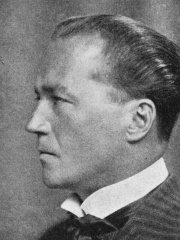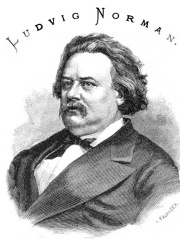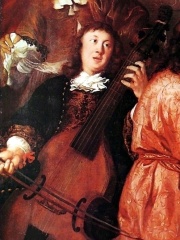
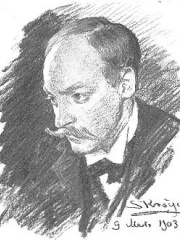
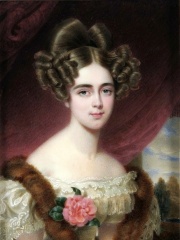
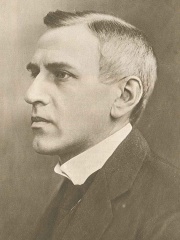
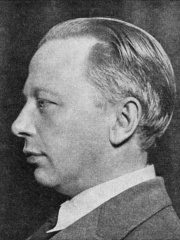
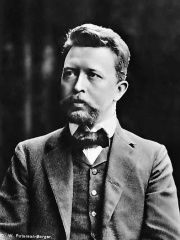

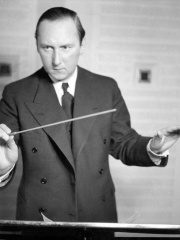
The Most Famous
COMPOSERS from Sweden
Top 10
The following people are considered by Pantheon to be the top 10 most legendary Swedish Composers of all time. This list of famous Swedish Composers is sorted by HPI (Historical Popularity Index), a metric that aggregates information on a biography's online popularity. Visit the rankings page to view the entire list of Swedish Composers.

1. Dieterich Buxtehude (1637 - 1707)
With an HPI of 78.14, Dieterich Buxtehude is the most famous Swedish Composer. His biography has been translated into 61 different languages on wikipedia.
Dieterich Buxtehude (German: [ˈdiːtəʁɪç bʊkstəˈhuːdə]; born Diderich Hansen Buxtehude, Danish: [ˈtiðˀəʁek ˈhænˀsn̩ pukstəˈhuːðə]; c. 1637 – 9 May 1707) was a Danish composer and organist of the middle Baroque era, whose works are typical of the North German organ school. As a composer who worked in various vocal and instrumental idioms, Buxtehude's style greatly influenced other composers, such as Johann Sebastian Bach and George Frideric Handel. Buxtehude is considered one of the most important composers of the 17th century.

2. Hugo Alfvén (1872 - 1960)
With an HPI of 66.32, Hugo Alfvén is the 2nd most famous Swedish Composer. His biography has been translated into 32 different languages.
Hugo Emil Alfvén (Swedish: [alˈveːn] ; 1 May 1872 – 8 May 1960) was a Swedish composer, conductor, violinist, and painter. Alfvén was one of Sweden's principal composers. His "Swedish Rhapsody”, written when he was 31, is still one of the best-known pieces of Swedish music. After extensive European travels to develop his musical skills, Alfvén taught composition, before conducting choirs and orchestras. In 1954, he made the first Swedish classical stereo recordings. Hugo Alfvén’s extensive musical archive is held at Uppsala University, where he was music director for twenty-nine years.

3. Princess Cecilia of Sweden (1807 - 1844)
With an HPI of 63.96, Princess Cecilia of Sweden is the 3rd most famous Swedish Composer. Her biography has been translated into 27 different languages.
Cecilia of Sweden (22 June 1807 – 27 January 1844) was a composer, a Swedish princess by birth, and Grand Duchess of Oldenburg by marriage. She was the daughter of King Gustav IV Adolf of Sweden and Frederica of Baden.

4. Wilhelm Stenhammar (1871 - 1927)
With an HPI of 62.22, Wilhelm Stenhammar is the 4th most famous Swedish Composer. His biography has been translated into 20 different languages.
Carl Wilhelm Eugen Stenhammar (February 7, 1871 – November 20, 1927) was a Swedish composer, conductor and pianist. He is considered to be one of Sweden’s most important composers at the turn of the 20th century, and one of the finest Swedish pianists of his time, with a reputation as a fine interpreter of the piano music of Beethoven.

5. Johan Helmich Roman (1694 - 1758)
With an HPI of 62.11, Johan Helmich Roman is the 5th most famous Swedish Composer. His biography has been translated into 19 different languages.
Johan Helmich Roman (26 October 1694 – 20 November 1758) was a Swedish Baroque composer. He has been called "the father of Swedish music" or "the Swedish Handel." He was the leader of the Swedish Royal Orchestra during the first decades of Sweden's Age of Liberty.

6. Kurt Atterberg (1887 - 1974)
With an HPI of 61.21, Kurt Atterberg is the 6th most famous Swedish Composer. His biography has been translated into 23 different languages.
Kurt Magnus Atterberg (Swedish: [²atːɛrbærj], 12 December 1887 – 15 February 1974) was a Swedish composer and civil engineer. Along with Ture Rangström, he was one the foremost Swedish composers of the generation succeeding Wilhelm Peterson-Berger, Wilhelm Stenhammar and Hugo Alfvén. Atterberg is best known for his symphonies, operas, and ballets.

7. Wilhelm Peterson-Berger (1867 - 1942)
With an HPI of 60.15, Wilhelm Peterson-Berger is the 7th most famous Swedish Composer. His biography has been translated into 19 different languages.
Olof Wilhelm Peterson-Berger ( 27 February 1867 – 3 December 1942) was a Swedish composer and music critic. As a composer, his main musical influences were Grieg, August Söderman and Wagner as well as Swedish folk idiom.

8. Allan Pettersson (1911 - 1980)
With an HPI of 58.49, Allan Pettersson is the 8th most famous Swedish Composer. His biography has been translated into 19 different languages.
Gustaf Allan Pettersson (19 September 1911 – 20 June 1980) was a Swedish composer and violist. He is considered one of the 20th century's most important Swedish composers and was described as one of the last great symphonists, often compared to Gustav Mahler. His music can hardly be confused with other 20th-century works. In the final decade of his life, his symphonies (typically one-movement works) developed an international following, particularly in Germany and Sweden. Of these, his best known work is Symphony No. 7. His music later found success in the United States. The conductors Antal Doráti and Sergiu Comissiona premiered and recorded several of his symphonies. Pettersson's song cycle Barefoot Songs influenced many of his compositions. Doráti arranged eight of the Barefoot Songs. Birgit Cullberg produced three ballets based on Pettersson's music. Pettersson studied at the Royal Swedish Academy of Music's conservatory. For more than a decade, he was a violist in the Stockholm Concert Society; after retiring he devoted himself exclusively to composition. Later in his life, he experienced rheumatoid arthritis. Pettersson was awarded the Swedish royal medal Litteris et Artibus.

9. Lars-Erik Larsson (1908 - 1986)
With an HPI of 57.39, Lars-Erik Larsson is the 9th most famous Swedish Composer. Her biography has been translated into 18 different languages.
Lars-Erik Vilner Larsson (15 May 1908 – 27 December 1986) was a Swedish composer, conductor, radio producer, and educator. He wrote three of the most popular works (each a suite) in Swedish art music: A Winter's Tale (En vintersaga; 1937–1938), the Pastoral Suite (Pastoralsvit; 1938), and God in Disguise (Förklädd gud; 1940). Other notable works by Larsson include three symphonies, a sinfonietta, and numerous concertante works.
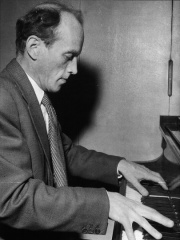
10. Einar Englund (1916 - 1999)
With an HPI of 56.89, Einar Englund is the 10th most famous Swedish Composer. His biography has been translated into 17 different languages.
Sven Einar Englund (17 June 1916 – 27 June 1999) was a Finnish composer.
People
Pantheon has 13 people classified as Swedish composers born between 1637 and 1948. Of these 13, none of them are still alive today. The most famous deceased Swedish composers include Dieterich Buxtehude, Hugo Alfvén, and Princess Cecilia of Sweden.
Deceased Swedish Composers
Go to all RankingsDieterich Buxtehude
1637 - 1707
HPI: 78.14
Hugo Alfvén
1872 - 1960
HPI: 66.32
Princess Cecilia of Sweden
1807 - 1844
HPI: 63.96
Wilhelm Stenhammar
1871 - 1927
HPI: 62.22
Johan Helmich Roman
1694 - 1758
HPI: 62.11
Kurt Atterberg
1887 - 1974
HPI: 61.21
Wilhelm Peterson-Berger
1867 - 1942
HPI: 60.15
Allan Pettersson
1911 - 1980
HPI: 58.49
Lars-Erik Larsson
1908 - 1986
HPI: 57.39
Einar Englund
1916 - 1999
HPI: 56.89
Ture Rangström
1884 - 1947
HPI: 56.78
Ludvig Norman
1831 - 1885
HPI: 56.43
Overlapping Lives
Which Composers were alive at the same time? This visualization shows the lifespans of the 11 most globally memorable Composers since 1700.

